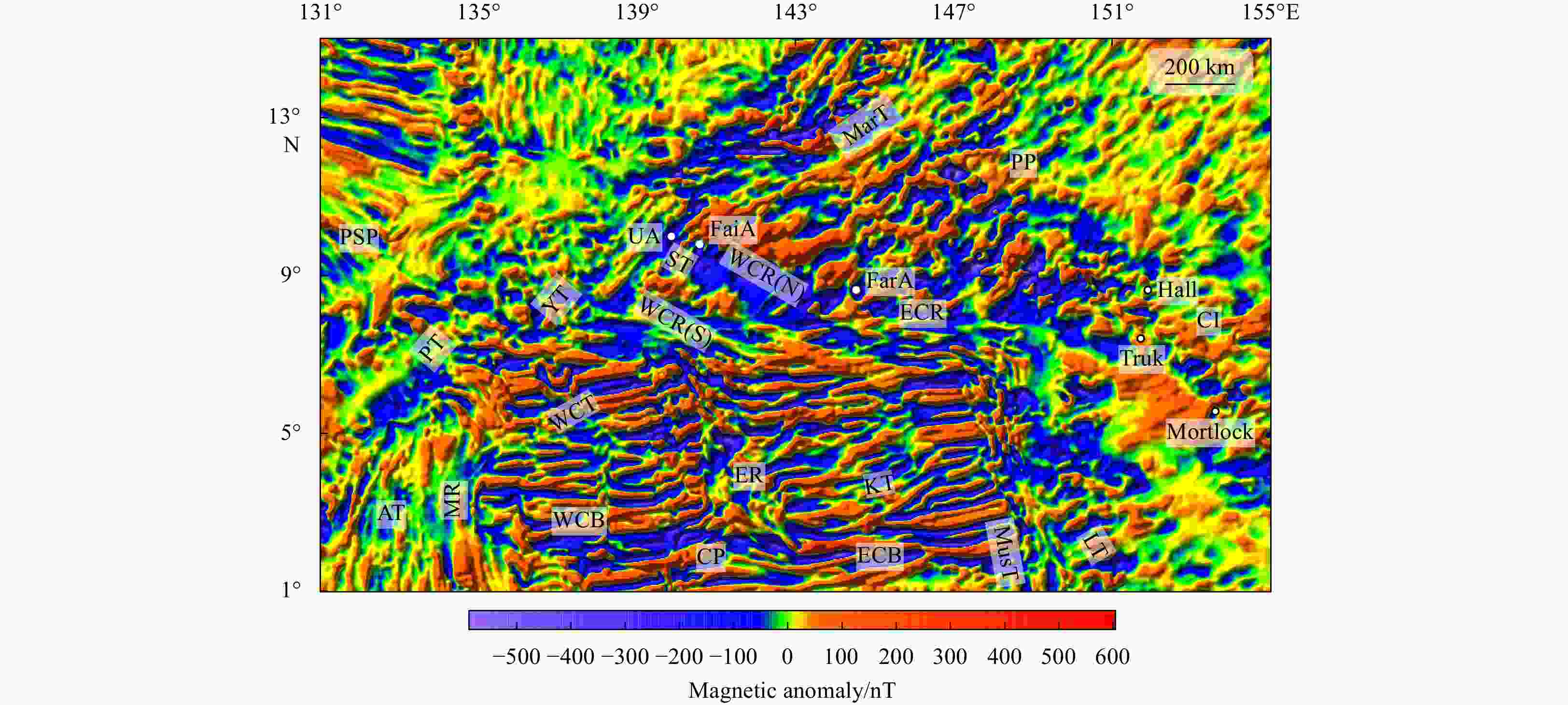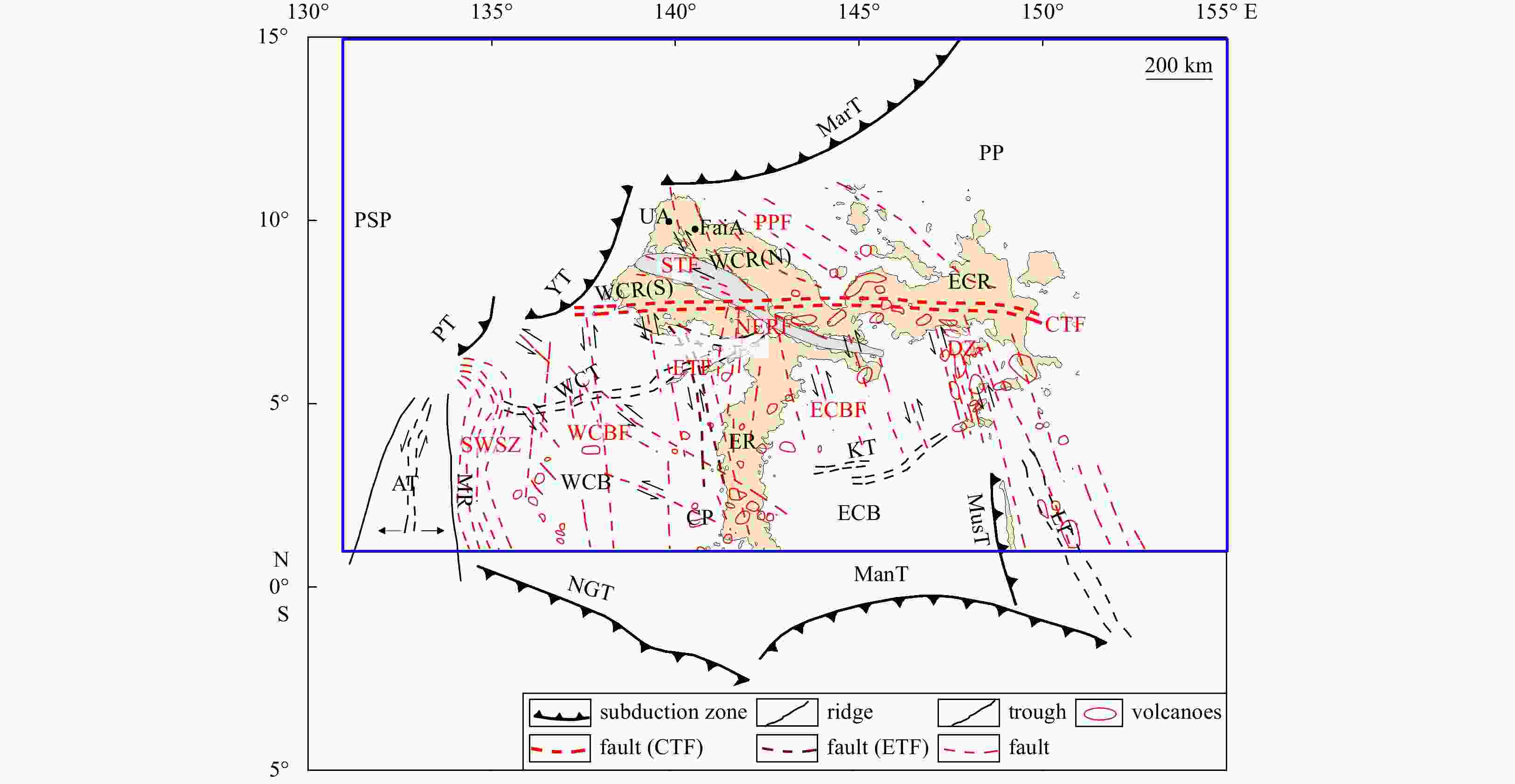-
Abstract: The Caroline Plate is located among the Pacific Plate, the Philippine Sea Plate, and the India Australia Plate, and plays a key role in controlling the spreading direction of the Philippine Sea Plate. The Caroline Submarine Plateau (or Caroline Ridge) and the Eauripik Rise on the south formed a remarkable T-shaped large igneous rock province, which covered the northern boundary between the Caroline Plate and the Pacific Plate. However, relationship between these tectonic units and magma evolution remains unclear. Based on magnetic data from the Earth Magnetic Anomaly Grid (2-arc-minute resolution) (V2), the normalized vertical derivative of the total horizontal derivative (NVDR-THDR) technique was used to study the boundary of the Caroline Plate. Results show that the northern boundary is a transform fault that runs
1400 km long in approximately 28 km wide along the N8° in E-W direction. The eastern boundary is an NNW-SSE trending fault zone and subduction zone with a width of tens to hundreds of kilometers; and the north of N4° is a fracture zone of dense faults. The southeastern boundary may be the Lyra Trough. The area between the southwestern part of the Caroline Plate and the Ayu Trough is occupied by a wide shear zone up to 100 km wide in nearly S-N trending in general. The Eauripik transform fault (ETF) in the center of the Caroline Plate and the fault zones in the east and west basins are mostly semi-parallel sinistral NNW-SSE–trending faults, which together with the eastern boundary Mussau Trench (MT) sinistral fault, the northern Caroline transform fault (CTF), and the southern shear zone of the western boundary, indicates the sinistral characteristics of the Caroline Plate. The Caroline hotspot erupted in the Pacific Plate near the CTF and formed the west Caroline Ridge, and then joined with the Caroline transform fault at the N8°. A large amount of magma erupted along the CTF, by which the east Caroline Ridge was formed. At the same time, a large amount of magma developed southward via the eastern branch of the ETF, forming the northern segment of the Eauripik Rise. Therefore, the magmatic activity of the T-shaped large igneous province is obviously related to the fault structure of the boundary faults between the Caroline Plate and Pacific Plate, and the active faults within the Caroline Plate. -
Figure 1. Submarine topography and geological units in the research area. The topography data are from GEBCO Compilation Group (2022) GEBCO_2022 Grid. The magnetic lineation data in the Caroline Basin are from Gaina and Müller (2007). The magnetic lineation in the Pacific Plate is from Zhu et al. (2022). The white dots represent islands in the Federated States of Micronesia. The white dotted line is the presumed boundary between the Caroline Plate and the Pacific Plate. The green dashed line indicates the modeled track of the Caroline hot spot since 25 Ma, based on Wu et al. (2016). AT: Ayu Trough; BS: Bismark Sea; CHS: Caroline Hot Spot; CHST: Caroline Hot Spot Track; CI: Caroline Islands; CP: Caroline Plate; ECB: east Caroline Basin; ECR: east Caroline Ridge; ER: Eauripik Rise; FaiA: Fais Atoll; FarA: Faraulep Atoll; I-AP: Indo-Australian Plate; KT: Kiilsgaard Trough; LT: Lyra Trough; ManT: Manus Trench; MR: Mapia Ridge; MarT: Mariana Trench; MHS: Manus Hot Spot; MusT: Mussau Trench; NGT: New Guinea Trench; PP: Pacific Plate; PT: Palau Trench; PSP: Philippine Sea Plate; ST: Sorol Trough: UA: Ulithi Atoll; WCB: west Caroline Basin; WCR(N): west Caroline Ridge (North); WCR(S): west Caroline Ridge (South); WCT: west Caroline Trough; YT: Yap Trench. The red star indicates the Site CJ09–82 (Yan et al., 2022). The green triangles are dredge hauls by R/V Kexue from the Institute of Oceanology, Chinese Academy of Sciences (Zhang et al., 2020). The blue triangles are dredge hauls by the R/V Vema (hauls D19, D20, and D21) (Fornari et al., 1979). DSDP 57 and DSDP 62 are from Ian Ridley et al. (1974) and Den et al. (1971), respectively (a). The free air gravity anomaly (satellite altimetry gravity anomaly) map of the research area (b). Data are from Sandwell et al. (2021). The names of geological units are the same as Fig. 1a.
Figure 2. ΔT magnetic anomaly map of the research area. The geological unit names are the same as Fig. 1a.
Figure 4. The distribution of the Caroline Plate fault. The yellow-and-green lines are NVDR-THDR of RTP magnetic anomaly. The purple line in the upper right corner is the magnetic lineation recognized by Zhu et al. (2022). CTF: Caroline transform fault; DZ: Disruptured zone in the northern section of the eastern boundary of the Caroline Plate; ECBF: NNW trending fault in the East Caroline Basin; LT: Lyra Trough; MusT: Mussau Trench; ETF: Eauripik transform fault; NERF: northern Eauripik Rise fault; PPF: NW trending fault zone in the Pacific Plate; STF: Sorol Trough fault zone; SWSZ: Southwest shear zone; WCBF: west Caroline Basin Fault.
Figure 5. Schematic diagram showing the sinistral movement of the Caroline Plate, the distribution of faults in the research area, and the locations of the west Caroline Ridge, east Caroline Ridge, and Eauripik Rise. The geological unit names are the same as in Fig. 1a, and the fault zone names are the same as in Fig. 4. The light-brown area is the enclosure of
3000 m isobath, which is also the T-shaped large igneous province. -
Austria R S P, Parcutela N E, Reyes E M L, et al. 2022. Magnetic field characterization of Macolod Corridor (Luzon, Philippines): New perspectives on rifting in a volcanic arc setting. Tectonophysics, 822: 229179, doi: 10.1016/j.tecto.2021.229179 Bird P. 2003. An updated digital model of plate boundaries. Geochemistry, Geophysics, Geosystems, 4(3): 1027 Bracey D R. 1983. Geophysics and tectonic development of the Caroline basin. Bay St. Louis: US Naval Oceanographic Office. Campbell I H. 2007. Testing the plume theory. Chemical Geology, 241(3-4): 153–176, doi: 10.1016/j.chemgeo.2007.01.024 Campbell I H, Griffiths R W, Hill R I. 1989. Melting in an Archaean mantle plume: heads it's basalts, tails it's komatiites. Nature, 339(6227): 697–699, doi: 10.1038/339697a0 Coffin M F, Eldholm O. 1994. Large igneous provinces: crustal structure, dimensions, and external consequences. Reviews of Geophysics, 32(1): 1–36, doi: 10.1029/93RG02508 Conrad C P, Bianco T A, Smith E I, et al. 2011. Patterns of intraplate volcanism controlled by asthenospheric shear. Nature Geoscience, 4(5): 317–321, doi: 10.1038/ngeo1111 Den N, Ludwig W J, Murauchi S, et al. 1971. Sediments and structure of the Eauripik-New Guinea Rise. Journal of Geophysical Research, 76(20): 4711–4723, doi: 10.1029/JB076i020p04711 Deschamps A, Lallemand S. 2002. The West Philippine Basin: An Eocene to early Oligocene back arc basin opened between two opposed subduction zones. Journal of Geophysical Research: Solid Earth, 107(B12): EPM1 1-1–EPM1 1-24 Dietmar Müller R, Sdrolias M, Gaina C, et al. 2008. Age, spreading rates, and spreading asymmetry of the world's ocean crust. Geochemistry, Geophysics, Geosystems, 9(4): Q04006 Dong Dongdong, Zhang Zhengyi, Bai Yongliang, et al. 2018. Topographic and sedimentary features in the Yap subduction zone and their implications for the Caroline Ridge subduction. Tectonophysics, 722: 410–421, doi: 10.1016/j.tecto.2017.11.030 Duncan R A, Richards M A. 1991. Hotspots, mantle plumes, flood basalts, and true polar wander. Reviews of Geophysics, 29(1): 31–50, doi: 10.1029/90RG02372 Fan Jianke, Zheng Hong, Zhao Dapeng, et al. 2022. Seismic structure of the Caroline plateau-yap trench collision zone. Geophysical Research Letters, 49(6): e2022GL098017, doi: 10.1029/2022GL098017 Fornari D J, Weissel J K, Perfit M R, et al. 1979. Petrochemistry of the Sorol and Ayu Troughs: implications for crustal accretion at the northern and western boundaries of the Caroline Plate. Earth and Planetary Science Letters, 45(1): 1–15, doi: 10.1016/0012-821X(79)90102-X Fujiwara T, Tamaki K, Fujimoto H, et al. 1995. Morphological studies of the Ayu Trough, Philippine Sea-Caroline Plate boundary. Geophysical Research Letters, 22(2): 109–112, doi: 10.1029/94GL02719 Fujiwara T, Tamura C, Nishizawa A, et al. 2000. Morphology and tectonics of the Yap Trench. Marine Geophysical Researches, 21(1-2): 69–86 Gaina C, Müller D. 2007. Cenozoic tectonic and depth/age evolution of the Indonesian gateway and associated back-arc basins. Earth-Science Reviews, 83(3-4): 177–203, doi: 10.1016/j.earscirev.2007.04.004 Godfrey Fitton J, Godard M. 2004. Origin and evolution of magmas on the Ontong Java Plateau. Origin and Evolution of the Ontong Java Plateau, 229(1): 151–178 Hall R. 2002. Cenozoic geological and plate tectonic evolution of SE Asia and the SW Pacific: computer-based reconstructions, model and animations. Journal of Asian Earth Sciences, 20(4): 353–431, doi: 10.1016/S1367-9120(01)00069-4 Hall R, Fuller M, Ali J R, et al. 1995. The Philippine Sea Plate: magnetism and reconstructions. In: Taylor B, Natland J, eds. Active Margins and Marginal Basins of the Western Pacific. Washington: American Geophysical Union, 371–404 He Tao, Xiong Shengqing, Wang Wanyin. 2022. Three-dimensional transformation of magnetization direction and magnetic field component at low latitudes based on vertical relationship. Applied Geophysics, 19(1): 91–106, doi: 10.1007/s11770-022-0928-4 Heezen B C, Gray C, Segre A G, et al. 1971. Evidence of foundered continental crust beneath the central Tyrrhenian Sea. Nature, 229(5283): 327–329, doi: 10.1038/229327a0 Hegarty K A, Weissel J K. 1988. Complexities in the development of the Caroline Plate region, western equatorial Pacific. In: Nairn A E M, Stehli F G, Uyeda S, eds. The Ocean Basins and Margins. Boston: Springer, 277–301 Hegarty K A, Weissel J K, Hayes D E. 1983. Convergence at the Caroline-Pacific plate boundary: collision and subduction. In: Hayes D E, ed. The Tectonic and Geologic Evolution of Southeast Asian Seas and Islands: Part 2. Washington: American Geophysical Union, 27: 326–348 Hill K C, Hall R. 2002. Mesozoic-Cainozoic evolution of Australia’s New Guinea margin in a West Pacific context. Defining Australia: the Australian Plate as Part of Planet Earth: Geological Society of America and Geological Society of Australia, joint publication, special paper, 1-43 Hill K C, Hegarty K A. 1988. Tectonic interactions between New Guinea and the Caroline Plate-Implications for backarc spreading, achievements in Australian geosciences. In: 9th Australian Geological Convention. Brisbane: Geological Society of Australia, 192–193 Hong J K, Lee S M. 2002. Reflection seismology in the southern Ayu Trough, a slow-spreading divergent boundary. Ocean and Polar Research, 24(3): 189–196, doi: 10.4217/OPR.2002.24.3.189 Ian Ridley W, Rhodes J M, Reid A M, et al. 1974. Basalts from leg 6 of the deep-sea drilling project. Journal of Petrology, 15(1): 140–159, doi: 10.1093/petrology/15.1.140 Jackson M G, Shirey S B, Hauri E H, et al. 2016. Peridotite xenoliths from the Polynesian Austral and Samoa hotspots: Implications for the destruction of ancient 187Os and 142Nd isotopic domains and the preservation of Hadean 129Xe in the modern convecting mantle. Geochimica et Cosmochimica Acta, 185: 21–43, doi: 10.1016/j.gca.2016.02.011 Karig D E. 1975. Basin genesis in the Philippine Sea. Initial reports of the deep sea drilling project 31, 857-879. Keating B H, Mattey D P, Helsley C E, et al. 1984. Evidence for a hot spot origin of the Caroline Islands. Journal of Geophysical Research: Solid Earth, 89(B12): 9937–9948, doi: 10.1029/JB089iB12p09937 Kim Y M, Lee S M, Okino K. 2009. Comparison of gravity anomaly between mature and immature intra-oceanic subduction zones in the western Pacific. Tectonophysics, 474(3-4): 657–673, doi: 10.1016/j.tecto.2009.05.004 Kobayashi K. 2004. Origin of the Palau and Yap trench-arc systems. Geophysical Journal International, 157(3): 1303–1315, doi: 10.1111/j.1365-246X.2003.02244.x Koppers A A P, Staudigel H, Pringle M S, et al. 2003. Short-lived and discontinuous intraplate volcanism in the South Pacific: Hot spots or extensional volcanism?. Geochem. Geophys. Geosyst. , 4(10), 1089.https://doi.org/10.1029/2003GC000533. Kotake Y. 2000. Study of the tectonics of Western Pacific region derived from GPS data analysis. Bulletin of the Earthquake Research Institute, University of Tokyo, 75: 229–334 Lee S M. 2004. Deformation from the convergence of oceanic lithosphere into Yap trench and its implications for early-stage subduction. Journal of Geodynamics, 37(1): 83–102, doi: 10.1016/j.jog.2003.10.003 Lee J I, Hur S D, Park B K, et al. 2001. Geochemistry and K-Ar age of alkali basalts from Weno Island, Caroline Islands, Western Pacific. Ocean and Polar Research, 23(1): 23–34 Lee S M, Kim S S. 2004. Vector magnetic analysis within the southern Ayu Trough, equatorial western Pacific. Geophysical Journal International, 156(2): 213–221, doi: 10.1111/j.1365-246X.2003.02125.x Li Chunfeng, Wang Jian. 2016. Variations in Moho and Curie Depths and Heat Flow in Eastern and Southeastern Asia. Marine Geophysical Research, 37(1): 1–20, doi: 10.1007/s11001-016-9265-4 Li Chunfeng, Zhou Duo, Li Gang, et al. 2021. Geodynamic problems in the Western Pacific and future scientific drill targets. Earth Science (in Chinese), 46(3): 759–769 Li Sanzhong, Cao Xianzhi, Wang Guangzeng, et al. 2019. Meso-Cenozoic tectonic evolution and plate reconstruction of the Pacific Plate. Journal of Geomechanics (in Chinese), 25(5): 642–677 Liu Fen, Wang Wanyin, Ji Xiaolin. 2019. Influence factors and stability analysis of plane potential field continuation in space and frequency domains. Geophysical and Geochemical Exploration (in Chinese), 43(2): 320–328 Luo Xingang, Wang Wanyin, Zhang Gongcheng, et al. 2018. Study on distribution features of faults based on gravity data in the South China Sea and its adjacent areas. Chinese Journal of Geophysics (in Chinese), 61(10): 4255–4268 Ma Jie, Wang Wanyin, Du Xiangdong, et al. 2021. Study on system of faults in the gulf of Mexico and adjacent region based on gravity data. Acta Geologica Sinica-English Edition, 95(1): 305–318, doi: 10.1111/1755-6724.14643 MacLeod S J, Williams S E, Matthews K J, et al. 2017. A global review and digital database of large-scale extinct spreading centers. Geosphere, 13(3): GES01379.1 Macpherson C G, Hall R. 2001. Tectonic setting of Eocene boninite magmatism in the Izu-Bonin-Mariana forearc. Earth and Planetary Science Letters, 186(2): 215–230, doi: 10.1016/S0012-821X(01)00248-5 Mattey D P. 1982. The minor and trace element geochemistry of volcanic rocks from Truk, Ponape and Kusaie, eastern Caroline Islands; the evolution of a young hot spot trace across old Pacific Ocean crust. Contributions to Mineralogy and Petrology, 80(1): 1–13, doi: 10.1007/BF00376730 Maus S, Barckhausen U, Berkenbosch H, et al. 2009. EMAG2: A 2–arc min resolution Earth Magnetic Anomaly Grid compiled from satellite, airborne, and marine magnetic measurements. Geochemistry, Geophysics, Geosystems, 10(8): Q08005 Meyer B, Saltus R, Chulliat A. 2017. EMAG2: Earth magnetic anomaly grid (2-arc-minute resolution) version 3. Washington: National Centers for Environmental Information, NOAA. Mrozowski C L, Lewis S D, Hayes D E. 1982. Complexities in the tectonic evolution of the west Philippine Basin. Tectonophysics, 82(1-2): 1–24, doi: 10.1016/0040-1951(82)90085-3 Nagihara S, Kinoshita M, Fujimoto H, et al. 1989. Geophysical observations around the northern Yap Trench: Seismicity, Gravity and Heat flow. Tectonophysics, 163(1-2): 93–104, doi: 10.1016/0040-1951(89)90120-0 Perfit M R, Fornari D J. 1982. Mineralogy and geochemistry of volcanic and plutonic rocks from the boundaries of the Caroline Plate: Tectonic implications. Tectonophysics, 87(1-4): 279–313, doi: 10.1016/0040-1951(82)90230-X Richards M A, Duncan R A, Courtillot V E. 1989. Flood basalts and hot-spot tracks: plume heads and tails. Science, 246(4926): 103–107, doi: 10.1126/science.246.4926.103 Richards M A, Jones D L, Duncan R A, et al. 1991. A mantle plume initiation model for the Wrangellia flood basalt and other oceanic plateaus. Science, 254(5029): 263–267, doi: 10.1126/science.254.5029.263 Sager W W, Huang Yanming, Tominaga M, et al. 2019. Oceanic plateau formation by seafloor spreading implied by Tamu Massif magnetic anomalies. Nature Geoscience, 12(8): 661–666, doi: 10.1038/s41561-019-0390-y Sandwell D T, Harper H, Tozer B, et al. 2021. Gravity field recovery from geodetic altimeter missions. Advances in Space Research, 68(2): 1059–1072, doi: 10.1016/j.asr.2019.09.011 Schellart W P, Stegman D R, Freeman J. 2008. Global trench migration velocities and slab migration induced upper mantle volume fluxes: Constraints to find an Earth reference frame based on minimizing viscous dissipation. Earth-Science Reviews, 88(1-2): 118–144, doi: 10.1016/j.earscirev.2008.01.005 Seton M, Müller R D, Zahirovic S, et al. 2012. Global continental and ocean basin reconstructions since 200 Ma. Earth-Science Reviews, 113(3-4): 212–270, doi: 10.1016/j.earscirev.2012.03.002 Taylor B. 2006. The single largest oceanic plateau: Ontong Java-Manihiki-Hikurangi. Earth and Planetary Science Letters, 241(3-4): 372–380, doi: 10.1016/j.jpgl.2005.11.049 Tejada M L G, Suzuki K, Hanyu T, et al. 2013. Cryptic lower crustal signature in the source of the Ontong Java Plateau revealed by Os and Hf isotopes. Earth and Planetary Science Letters, 377–378: 84–96 Tuzo Wilson J. 1963. A possible origin of the Hawaiian Islands. Canadian Journal of Physics, 41(6): 863–870, doi: 10.1139/p63-094 Utkin V P. 2006. Role of strike-slip faulting of the oceanic lithosphere in the formation of Pacific volcanic belts. Doklady Earth Sciences, 409(1): 692–296, doi: 10.1134/S1028334X06050023 Wang Wanyin, Pan Yu, Qiu Zhiyun. 2009. A new edge recognition technology based on the normalized vertical derivative of the total horizontal derivative for potential field data. Applied Geophysics, 6(3): 226–233, doi: 10.1007/s11770-009-0026-x Weissel J K, Anderson R N. 1978. Is there a Caroline plate? Earth and Planetary Science Letters, 41(2): 143–158 Whittaker J M, Afonso J C, Masterton S, et al. 2015. Long-term interaction between mid-ocean ridges and mantle plumes. Nature Geoscience, 8(6): 479–483, doi: 10.1038/ngeo2437 Wu J, Suppe J, Lu Renqi, et al. 2016. Philippine Sea and East Asian plate tectonics since 52 Ma constrained by new subducted slab reconstruction methods. Journal of Geophysical Research: Solid Earth, 121(6): 4670–4741, doi: 10.1002/2016JB012923 Yan Shishuai, Yan Quanshu, Shi Xuefa, et al. 2022. The dynamics of the Sorol Trough magmatic system: Insights from bulk-rock chemistry and mineral geochemistry of basaltic rocks. Geological Journal, 57(10): 4074–4089, doi: 10.1002/gj.4529 Yang An, Fu Yongtao. 2018. Estimates of effective elastic thickness at subduction zones. Journal of Geodynamics, 117: 75–87, doi: 10.1016/j.jog.2018.04.007 Zhang Zhengyi, Dong Dongdong, Sun Weidong, et al. 2021. The Caroline Ridge fault system and implications for the bending-related faulting of incoming oceanic plateaus. Gondwana Research, 92: 133–148, doi: 10.1016/j.gr.2020.11.018 Zhang Zhen, Li Sanzhong, Wang Guangzeng, et al. 2022. Plate boundary processes of the Caroline Plate. Science China Earth Sciences, 65(8): 1554–1567, doi: 10.1007/s11430-021-9919-6 Zhang Guoliang, Yao Junhua, Xu Feng, et al. 2023. Origin of the Mussau Trench in the Western Pacific: Geochemical and mineralogical constraints from basalts and serpentinized peridotites. Chemical Geology, 642: 121798, doi: 10.1016/j.chemgeo.2023.121798 Zhang Guoliang, Zhang Ji, Wang Shuai, et al. 2020. Geochemical and chronological constraints on the mantle plume origin of the Caroline Plateau. Chemical Geology, 540: 119566, doi: 10.1016/j.chemgeo.2020.119566 Zhu Yingjie, Wang Wanyin, Farquharson C G, et al. 2021. Normalized vertical derivatives in the edge enhancement of maximum-edge-recognition methods in potential fields. Geophysics, 86(4): G23–G34, doi: 10.1190/geo2020-0165.1 Zhu Yingjie, Wang Wanyin, Kim Welford J, et al. 2022. Structural features in the mid-latitude Western Pacific based on gravity and magnetic anomalies. Chinese Journal of Geophysics (in Chinese), 65(5): 1712–1731 -





 下载:
下载:







